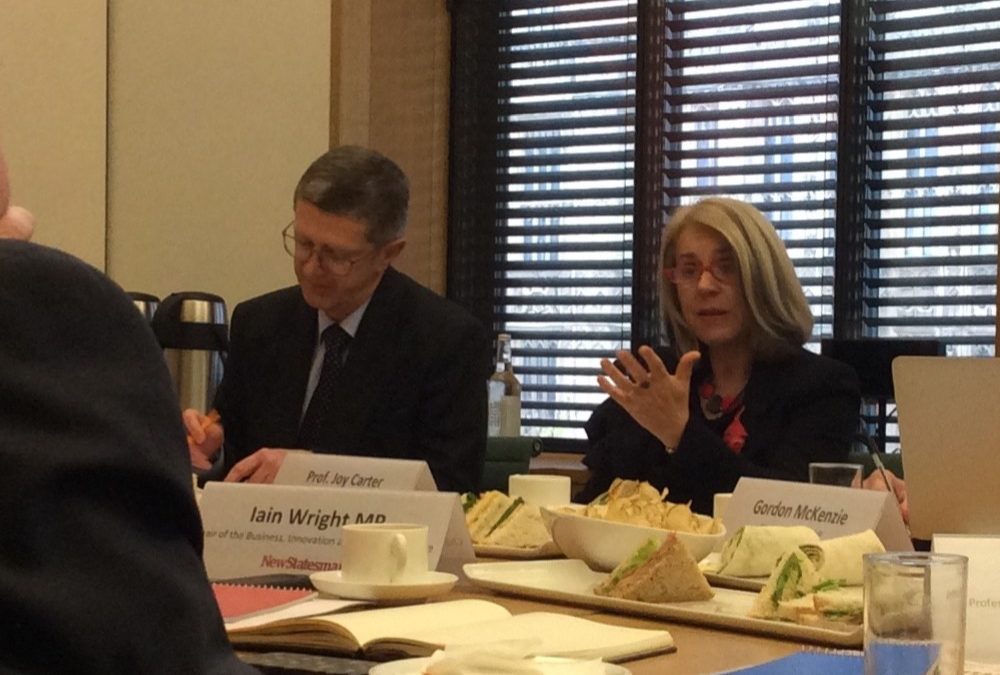The chair of the Parliamentary BIS Select Committee has warned Government plans for judging the quality of university teaching could put sector diversity and its impact on regional prosperity at risk. The Labour MP, Iain Wright, was speaking at a roundtable event, organised by the New Statesman and GuildHE, to highlight the role of universities as drivers of regional growth and innovation.
Mr Wright, whose constituency is Hartlepool, told university and business experts, specialist areas in higher education were key to driving innovation in local economies, but, he believed, the Government’s focus on metrics for assessing teaching quality in universities presented a challenge.
Iain Wright is currently leading the BIS Select Committee’s enquiry into assessing quality in HE, and is concerned the minister’s plan to harness the option of tuition fee rises to performance in the Teaching Excellence Framework will mean courses which score low in the TEF will be closed,
“One of the things that worries me is that people …..will game the system and we will lose the diversity of our sector.”
The issue of how Government funding influences behaviour was reflected in a wider discussion about the role for the state in enhancing university/business collaboration for the benefit of regional growth.
Chief Executive of GuildHE and former BIS civil servant, Gordon McKenzie, suggested an appropriate role was to create the right funding frameworks which, he argued, should generate finances that were stable, had a clear purpose, supported industry relevant higher education and avoided unintended consequences.
The point begs the question whether that is what currently exists. Several contributors argued not.
Former Secretary of State for Innovation, Universities and Skills, John Denham, described what we have now as an HE funding system designed for 18 year olds, following three year courses, living and studying away from home. Consequently, he argued, universities face few incentives or financial options to deliver anything but that,
“If you want more HE/business collaboration you have to start with a funding model which delivers that as a first principle; not one that is added on as an afterthought,” he said.
The former minister also warned the Government’s new Apprenticeship Levy presented universities and employers both an opportunity and a threat, in that the money available for this could mean other forms of valuable industry relevant education are allowed to wither – or, as Mr Denham put it, may “…. drive a coach and horses through existing good schemes.”
The point was picked up by Dr. David Llewellyn, Vice Chancellor of Harper Adams University, “Let’s not let new models like degree apprenticeships damage good existing models such as sandwich courses,” he commented.
Although the new degree apprenticeships, announced in March 2015 are in their early days and numbers are still low, Marcus Mason, Head of Business, Education and Skills at the British Chambers of Commerce, welcomed the opportunity they present for employers to contribute to decisions about higher education course content and the curriculum.
This influence was, according to Mr Mason, a key priority for employers. The notion that universities had to be seen in reciprocal partnerships and as part of a community if their contribution to regional growth were to succeed resonated around the table.
“How do I see universities? Not as the player; but as one of the players,” was how Neil Crockett, Chief Executive of Digital Catapult, expressed it. He believes collaboration can have a powerful impact on regional growth if it combines the expert specialisation found in higher education with a community of players who share an agenda.
This idea had appeal amongst small businesses, according to Charlotte Chung, representing the Federation of Small Businesses. Ms Chung pointed out many business communities include a significant number of very small enterprises and sole traders, and argued economic policies need to take account of this, “Think micro,” she urged.
The challenge of ensuring graduates are retained in the localities and regions where they studied was addressed by the Chair of GuildHE and VC at the University of Winchester, Professor Joy Carter. Winchester is delivering one of the new degree apprenticeships, a BSc degree in Digital and Technology Solutions with large corporations such as Fujitsu, and with SMEs as well.
Professor Carter suggested work place learning often cultivates a loyalty which means graduates are less likely to take their skills out of a region.
Many of the factors identified during the discussion as good for regional growth come to together in what might be called “clusters for innovation”. Harper Adams University is a leading specialist in agricultural and land-based studies, and VC, David Llewellyn, has positioned the university as part of a cluster which offers applied, marketable research, carried out in partnership with the industry and is part of the attraction for businesses to establish themselves in the region.
In conclusion, Gordon McKenzie summarised several key messages about how higher education can drive higher growth: being part of a reciprocal community; cultivating local clusters of applied research and diverse business activity; having a sense of geography and becoming champions of their region at home and abroad; and stability of funding.

